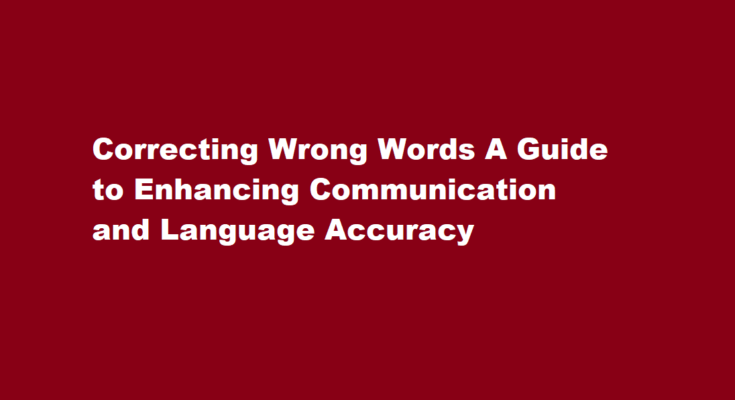Introduction
Language is a powerful tool that facilitates effective communication, allowing us to convey thoughts, emotions, and ideas. However, language is not immune to errors, and we often find ourselves using wrong words, leading to misinterpretations and misunderstandings. In this article, we will explore the significance of correcting wrong words, the common reasons behind these mistakes, and practical strategies to improve language accuracy.
The Importance of Correcting Wrong Words
Using the right words is crucial for clear and effective communication. Incorrect words can distort the intended message, affecting both personal and professional relationships. In the workplace, miscommunications can lead to costly errors and delays in projects, while in social settings, it may lead to awkward moments and unintended offense.
Common Reasons for Wrong Words Usage
- Homophones and Homonym Words that sound alike or have the same spelling but different meanings can easily lead to confusion. For instance, ‘their’ and ‘there,’ ‘your’ and ‘you’re,’ or ‘accept’ and ‘except.’
- Spelling Errors Misspelling words is a common reason for using the wrong word. Auto-correct features in digital communication have made this more prevalent.
- Lack of Vocabulary Insufficient knowledge of the language can result in substituting words that are close in sound but different in meaning.
- Cognitive Biases Our minds sometimes fill in the gaps with familiar words when we encounter unfamiliar ones, leading to unintentional errors.
- Typing Errors In the digital age, quick typing can lead to words being jumbled or incorrect substitutions.
Strategies for Correcting Wrong Words
Reading and Proofreading
One of the most effective ways to catch wrong words is to read written texts carefully. Proofreading allows you to identify spelling and grammatical errors, and it is a crucial step before submitting any written work. Take your time, read aloud if possible, and review the content multiple times to catch mistakes.
Expand Your Vocabulary
Strengthening your vocabulary is essential for language accuracy. Engage in activities like reading books, articles, and newspapers, and learning new words regularly. Use a dictionary or vocabulary-building apps to understand the precise meanings of words and their context of usage.
Seek Feedback
Another effective method to improve language accuracy is to seek feedback from others. Whether it’s a colleague, friend, or family member, having a fresh set of eyes can help identify mistakes you might have overlooked.
Use Technology Wisely
While technology can contribute to language errors, it can also be a valuable resource for correction. Utilize spell-checking and grammar-checking tools to spot errors, but don’t rely solely on them, as they may not catch all mistakes.
Practice Mindfulness in Communication
Being mindful of what you say or write can significantly reduce the likelihood of using wrong words. Slow down your speech and thought process to choose the most appropriate words for the situation.
Language Workshops and Courses
Consider attending language workshops or courses, especially if English is not your first language. These learning opportunities can provide structured guidance, practice exercises, and expert feedback to enhance language accuracy.
Create Flashcards
Creating flashcards with the correct usage of commonly confused words can reinforce your understanding and help you internalize the differences.
FREQUENTLY ASKED QUESTIONS
What are 30 spelling rules?
30 in words is written as “Thirty”. Number 30 is used to express a value or a count of objects. It comes at the 30th number in a set of natural numbers. The spelling or name of 30 in English is given by Thirty.
What is the Rabbit rule?
The ‘Rabbit rule’ says that if a word has two syllables, the vowel is short and there is only one consonant sound placed between the vowels, then the consonant in the middle is doubled.
Conclusion
Language accuracy is vital for effective communication and establishing meaningful connections with others. By understanding the reasons behind using wrong words and employing the strategies mentioned above, you can improve your language skills and minimize errors. Whether it’s in professional settings or personal interactions, the ability to choose the right words can make a significant difference in conveying your ideas accurately and confidently. Keep practicing, stay open to learning, and gradually, you will witness a positive transformation in your language proficiency.
Read Also : Your Guide to Signing Up for Google TV



